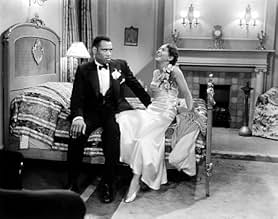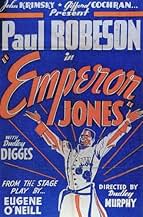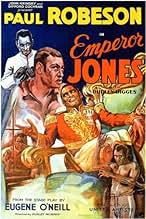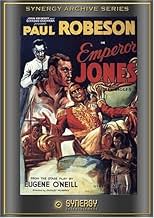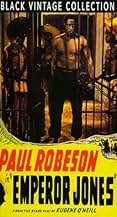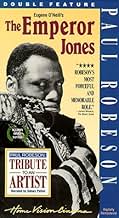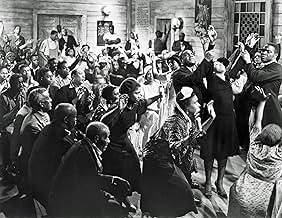Adicionar um enredo no seu idiomaUnscrupulously ambitious Brutus Jones escapes from jail after killing a guard and through bluff and bravado finds himself the emperor of a Caribbean island.Unscrupulously ambitious Brutus Jones escapes from jail after killing a guard and through bluff and bravado finds himself the emperor of a Caribbean island.Unscrupulously ambitious Brutus Jones escapes from jail after killing a guard and through bluff and bravado finds himself the emperor of a Caribbean island.
- Direção
- Roteiristas
- Artistas
- Prêmios
- 2 vitórias no total
- Jeff
- (as Frank Wilson)
- Lem
- (as George Stamper)
- Carrington
- (não creditado)
- Stick-man
- (não creditado)
- Extra in Nightclub Scene
- (não creditado)
- Court Crier
- (não creditado)
- Pianist
- (não creditado)
- Marcella
- (não creditado)
- Young Tap Dancer
- (não creditado)
- Treasurer
- (não creditado)
- Extra in Nightclub Scene
- (não creditado)
- Extra in Nightclub Scene
- (não creditado)
Avaliações em destaque
Brutus Jones is a tremendous step forward in American dramaturgy because he is the central figure. Than said O'Neill's play still maintains stereotyping. Brutus is a porter on a train, who frequently plays craps, and who has an argument with his friend Jeff and kills him in a fight with razors. He flees to a foreign island, and he soon discovers that he has leadership qualities there that enable him to set up a monarchy there with himself as Emperor. He even sets up a court with uniformed courtiers. But the moment he gives orders to destroy a village for not showing proper deference to him, his reign begins to fall apart. And soon from being Emperor he becomes a hunted animal.
The stereotyping continues, with Brutus slowly losing his bearings and balance due to the incessant drums beating in the forest surrounding him. He hallucinates and sees the ghost of Jeff. He has always spread the word of his invincibility by saying only silver bullets could kill him. So his pursuers melt silver down to make the bullets they use to hunt him down and kill him.
As was pointed out on another discussion of the film on this thread, O'Neill based the fall of Jones on that of Haitian Emperor Henri I (Henri Christophe), except that he committed suicide with a silver bullet when he was about to be captured and executed.
The play was successful, and would be one of the first triumphs in Paul Robeson's career. He did not originate the role (as he did not originate the role of Joe in the stage production of SHOWBOAT). But he became identified with the role - to the point that he made this independent, somewhat defective production of the film in 1933. Except for Dudley Digges, as the one white man in Jones' kingdom (and Jones' occasional intimate), the cast is pretty forgettable. But it is watching Robeson in his one major lead role that holds our attention. He is a commanding figure in the film and fits the role of a man who loses his throne and power and sanity and life in one evil night. Still, one really wishes that the film's production values could have been better - some of the special effects (the appearance of the ghost of Jeff for example) are quite weak.
With it's defects it is a measure of watching Robeson at his best that I'd rate it a "7" out of "10".
The original play has the white merchant character Smithers played here by Dudley Digges as the eyes of author O'Neill who narrates the first scene in flashback. Here we have a straight narrative with a backstory added. If you think that the backstory looks something like Porgy And Bess that's because the screenplay was written by Dubose Hayward the original author of that work before the Gershwin brothers set it to music.
Back in those days being a Pullman porter was a status symbol among black people, the first labor union organized that gained decent wages and collective bargaining rights for black people was the Brotherhood of Sleeping Car Porters. When Brutus Jones kills his friend in that crap game in a fight over a woman, he's not just a fugitive, he's lost a lot of standing among his peers. But in fleeing to that Caribbean island where the natives are descended from escaped slaves who still retained some animist beliefs from Africa, he's got it all over this crowd and reasserts himself with nerve, knowledge, and a little trickery and a bit of help from Dudley Digges's character.
Although he did not originate the role, Paul Robeson debuted with it on the London stage and the actor who Eugene O'Neill handpicked to originate the part, one Charles Gilpin faded into obscurity. Of course there's also no singing in O'Neill's Emperor Jones, but Robeson's bass/baritone gets a few good songs in as well, from hymns, to Negro spirituals, to some convict laments. Robeson was always a powerful performer no matter what you think of his politics.
This version of The Emperor Jones has as much Hayward as O'Neill, still what O'Neill was trying to convey comes out in a glorious triumphal performance by Paul Robeson.
The sound quality is poor (an abominable affront to Robeson's magnificent baritone singing Waterboy) and director Dudley Murphy for the most part keeps his camera static with uninspired composition as Robeson electrifies from scene to scene. Whether brimming with confidence or desperately trapped he is a man in full. It is painstakingly evident that this enormous talent deserved MGM treatment and his loss is ours as well. Uglier things were happening in America back then in terms of institutional racism but the shabby handling of this man's incredible abilities is a clear example of prejudice in another form.
While Robeson holds the center if not all the film, Frank Wilson as Jeff, a veteran porter that shows Brutus the ropes spars well with him especially in one of the film's better ensemble scenes in a juke joint crap game down South. Dudley Diggs as Smithers the surly white trader he outsmarts has some decent lines but for the most part is pure English vaudeville.
The Emperor Jones may be a rickety production but it remains valuable in displaying the qualities of a mighty talent, tragically wasted by the "American Way" of the times.
Você sabia?
- CuriosidadesFredi Washington had to reshoot her scenes wearing dark make-up when the Hays Office deemed her as appearing too light-skinned in the first rushes. They feared audiences would think Paul Robeson was embracing a white actress.
- Erros de gravaçãoWhen Jones lands on a Caribbean island, there are prickly pear and San Pedro cacti on the beach, neither of which are found in the Caribbean.
- Citações
Brutus Jones: I's got five lead bullets in this gun good enough for common bush niggers. And after that, I's got this silver bullet left to cheat 'em outta gettin' me. I tells 'em, when the time comes, I kills myself with it. That's 'cause I'm the only man in the world big enough to get me.
- Versões alternativasThe 72-minute version has different opening credits. In the original version, the title reads "The Emperor Jones" in uppercase (capital) letters. In later prints of this film, including the 72-minute version nearly always screened on TV, the title reads merely "Emperor Jones" , in lowercase letters.
- ConexõesEdited into SanKofa Theater: The Emperor Jones (2022)
Principais escolhas
- How long is The Emperor Jones?Fornecido pela Alexa
Detalhes
- Data de lançamento
- País de origem
- Idioma
- Também conhecido como
- The Emperor Jones
- Locações de filme
- Eastern Service Studios, Astoria, Queens, Nova Iorque, Nova Iorque, EUA(Kaufman Astoria Studios since 1982)
- Empresa de produção
- Consulte mais créditos da empresa na IMDbPro
Bilheteria
- Orçamento
- US$ 263.000 (estimativa)
- Tempo de duração
- 1 h 12 min(72 min)
- Proporção
- 1.37 : 1

